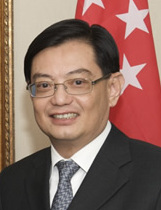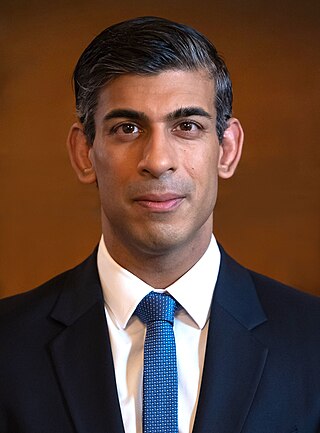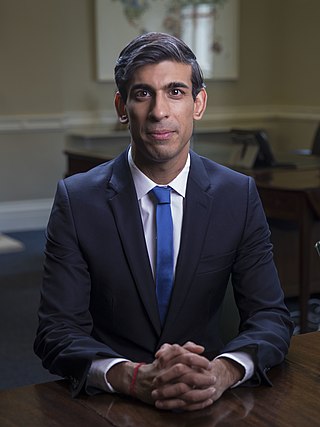
The Chancellor of the Exchequer, often abbreviated to Chancellor, is a senior minister of the Crown within the Government of the United Kingdom, and head of His Majesty's Treasury. As one of the four Great Offices of State, the chancellor is a high-ranking member of the British Cabinet.
BBC Parliament is a British free-to-air public broadcast television channel from the BBC that showcases parliamentary content from across the United Kingdom. It broadcasts live and recorded coverage of the House of Commons, House of Lords and Select Committees of the British Parliament, the Scottish Parliament, the London Assembly, the Northern Ireland Assembly and the Welsh Senedd. When none of these chambers are sitting, the channel does not broadcast, and its feed is given over to a simulcast of the BBC News channel.

Philip Hammond, Baron Hammond of Runnymede is a British politician and life peer who served as Chancellor of the Exchequer from 2016 to 2019, Foreign Secretary from 2014 to 2016, and Defence Secretary from 2011 to 2014. A member of the Conservative Party, he was the Member of Parliament (MP) for Runnymede and Weybridge from 1997 to 2019.

The Minister for Finance is a senior minister in the Government of Ireland. The Minister for Finance leads the Department of Finance and is responsible for all financial and monetary matters of the state; and is considered the second most important member of the Government of Ireland, after the Taoiseach.
An Australian federal budget is a document that sets out the estimated revenues and expenditures of the Australian Treasury in the following financial year, proposed conduct of Australian government operations in that period, and its fiscal policy for the forward years. Budgets are called by the year in which they are presented to Parliament and relate to a financial year that commences on the following 1 July and ends on 30 June of the following year, so that the 2023 budget brought down in May 2023 relates to the 2023/24 financial year.

The Union Budget of India, also referred to as the Annual Financial Statement in Article 112 of the Constitution of India, is the annual budget of the Republic of India set by Ministry of Finance for the following financial year, with the revenues to be gathered by Department of Revenue to identify planned government spending and expected government revenue and the expenditures gathered by Department of Expenditure of the public sector, to forecast economic conditions in compliance with government policy.

Red boxes, or sometimes ministerial boxes, are a type of despatch box produced by Barrow Hepburn & Gale or Wickwar & Co and are used by ministers in the British government and the British monarch to carry government documents. Similar in appearance to a briefcase, they are primarily used to hold and transport official ministerial papers. Red boxes are one modern form of despatch boxes, which have been in government use for centuries. Despatch boxes of a very different design remain in use in the chamber of the lower house of the British and Australian parliaments. Those boxes hold religious books for swearing-in new members of the chamber, but are also used as lecterns by front bench members.

Paschal Donohoe is an Irish Fine Gael politician who has served as Minister for Public Expenditure, National Development Plan Delivery and Reform since December 2022 and President of the Eurogroup since July 2020. He has been a Teachta Dála (TD) for the Dublin Central constituency since 2011. He served as Minister for Finance of Ireland from 2017 to 2022, Minister for Public Expenditure and Reform from 2016 to 2020, Minister for Transport, Tourism and Sport from 2014 to 2016 and Minister of State for European Affairs from 2013 to 2014.

Nirmala Sitharaman is an Indian economist, politician and a senior leader of the Bharatiya Janata Party (BJP) serving as the Minister of Finance and Minister of Corporate Affairs of the Government of India since 2019. She is a member of the Rajya Sabha, the upper house of the Indian Parliament, representing Karnataka since 2016 and previously represented Andhra Pradesh from 2014 to 2016. Sitharaman previously served as the 28th Defence Minister from 2017 to 2019, thereby becoming India's second female defence minister and the second female finance minister after Indira Gandhi, and the first full-time female minister to hold each of those portfolios. She served as junior minister in the Modi ministry between 2014 and 2017, holding successive positions, first for her dual appointment as the Minister of State in the Ministry of Finance and the Minister of State in the Ministry of Corporate Affairs from May to November 2014, and then as the Minister of State for the Ministry of Commerce and Industry from May 2014 to September 2017, before being elevated to senior posts within the Union Cabinet.

Heng Swee Keat is a Singaporean politician and former police officer who has been serving as 7th Deputy Prime Minister of Singapore since 2019 and Coordinating Minister for Economic Policies since 2020. He has been the Member of Parliament (MP) representing the Bedok division of East Coast GRC since 2020.
Sir Molwyn Joseph, KGCN, is an Antiguan politician and Chairman of the Antigua Labour Party (ALP). First entering politics in 1984 when he was made a Minister without Portfolio in the government of Vere Bird, Joseph became Minister of Finance seven years later, renegotiating the Antiguan national debt and introducing fiscal reforms. After a 1996 scandal in which it was discovered he had used his position to import a 1930s Rolls-Royce for a friend, bypassing normal import duties and taxes, he was dismissed from the Bird administration, returning 14 months later to serve as Minister for Planning, Implementation and the Environment. Following the 1999 general election, he became Minister of Heath and Social Improvement before being made Minister of Tourism and the Environment a few months later. As Minister, Joseph attempted to improve the perception of Antigua as a tourist destination and invest in the industry, spending 2 million US dollars increasing the number of hotel rooms on the island and providing money for both Air Jamaica and Air Luxor to provide flights to the island.

Rishi Sunak is a British politician who has served as Prime Minister of the United Kingdom and Leader of the Conservative Party since 2022. The first British Asian prime minister, he previously held two cabinet positions under Boris Johnson, latterly as Chancellor of the Exchequer from 2020 to 2022. Sunak has been Member of Parliament (MP) for Richmond (Yorks) since 2015.

Kate Elizabeth Forbes is a Scottish politician. A member of the Scottish National Party (SNP), she has been the Member of the Scottish Parliament (MSP) for the Skye, Lochaber and Badenoch constituency since the 2016 Scottish Parliament election. She also served as the Cabinet Secretary for Finance and the Economy from 2020 to 2023.

BBC Politics Live is a weekday BBC News lunchtime political programme which launched on 3 September 2018. It broadcasts when the Parliament is in session and during the three-week party conference season.

The 47th G7 summit was held from 11 to 13 June 2021 in Cornwall, England, during the United Kingdom's tenure of the presidency of the Group of Seven (G7), an inter-governmental political forum of seven advanced nations.
A Ministerial Broadcast, also known as a Prime Ministerial Broadcast or Ministerial Statement is a televised address to the British public, usually given by the incumbent Prime Minister or other senior Cabinet Minister in times of national crisis. The BBC and other public service broadcasters must give the government air time if the circumstances are seen to be of sufficient importance, and requests from opposition leaders must also be considered.

Rishi Sunak served as Chancellor of the Exchequer of the United Kingdom from his appointment on 13 February 2020 to his resignation on 5 July 2022. His tenure was dominated by the COVID-19 pandemic in the United Kingdom, with Sunak becoming a prominent figure in the government's response to the pandemic, giving economic support to struggling businesses through various schemes. He was also involved in the government's response to the cost of living crisis, UK energy supply crisis, and global energy crisis.

The 1990 United Kingdom budget was delivered by John Major, the Chancellor of the Exchequer, to the House of Commons on 20 March 1990. It was the only budget to be delivered by Major during his tenure as Chancellor, and the twelfth and final budget to be presented by the Conservative government of Margaret Thatcher, who would resign as prime minister later that year. The 1990 budget also marked the first occasion on which a budget statement was televised, after cameras were allowed into the House of Commons in November 1989.

The November 1993 United Kingdom budget was delivered by Kenneth Clarke, the Chancellor of the Exchequer, to the House of Commons on 30 November 1993. It was the second budget to be presented in 1993, and the first to be presented by Clarke following his appointment as Chancellor by Prime Minister John Major earlier that year. The November 1993 budget was also the first in the modern era to be held in the autumn, the government having decided to move the date of the budget so it could outline its tax and spending plans at the same time.

The March 1993 United Kingdom budget was delivered by Norman Lamont, the Chancellor of the Exchequer, to the House of Commons on 16 March 1993. It was the third and final budget to be presented by Lamont during his tenure as chancellor, and the final spring budget to be outlined before the Conservatives unified their tax and spending plans into one budget statement.














